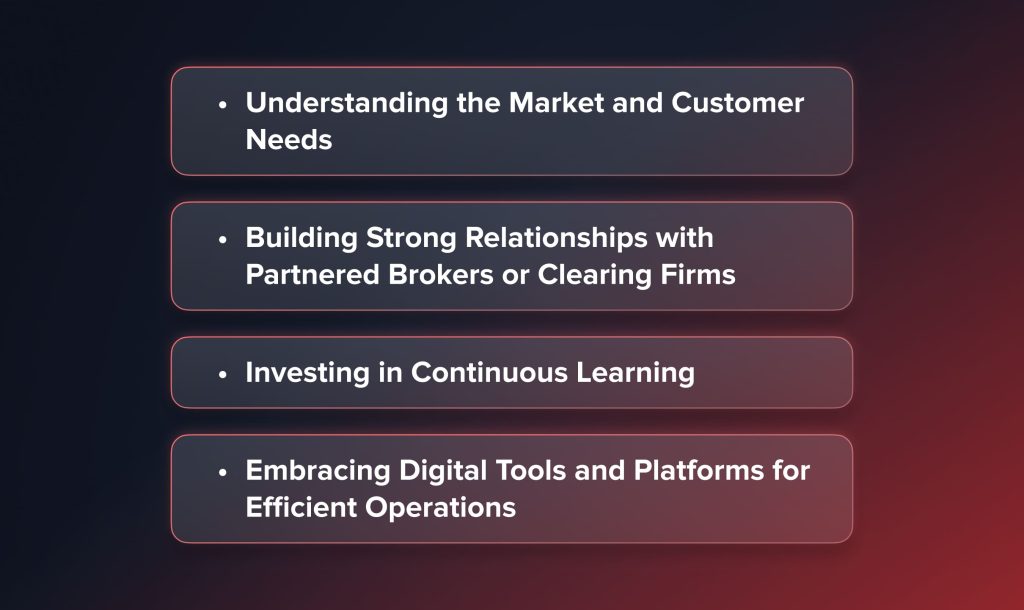
Who is an Introducing Broker, and How Does it Work?
Contents
An Introducing Broker (IB) serves as a middleman, or intermediary, bringing clients to a brokerage business. An IB, on the other hand, does not execute transactions or keep client assets; rather, it refers a client to a bigger brokerage business, which subsequently manages the customer’s account. To comprehend the critical function IBs play in the trading industry, analyze what they do, how important they are, and the benefits they offer.
Definition and Role of an Introducing Broker
Essentially an Introducing Broker acts as a bridge between traders and larger, comprehensive brokerage firms. Their primary duty involves introducing clients to these entities. What does this entail practically?
Fundamentally an IB often serves as the point of contact for a trader or investor looking to navigate the financial markets. While they may not directly conduct trades or manage client funds, they play a role in advising, guiding and steering clients towards full service brokers based on their specific requirements and investment objectives.
Moreover, the roles of an IB transcend mere introductions. They are often involved in providing personalized services and sometimes even technical support to their clientele. Their strong connections with brokerage firms allow them to offer solutions that may not be easily accessible to individual traders who approach brokers directly.
With the advancement of technology (IBs) are increasingly incorporating these tools into their operations. Artificial Intelligence (AI) is revolutionizing the analysis of market trends and customer data. The rise and acceptance of technology have contributed to transparency, customer protection and security measures thereby fostering greater customer trust. By integrating these technologies IBs are able to enhance the customer experience, satisfaction levels as well as boost operational efficiency.
In order to grasp the environment and the ecosystem in which an Introducing Broker functions it is essential to distinguish between IBs, affiliates and full service brokers.
IBs vs. Affiliates
Affiliates act as part of a broader marketing strategy for these firms. The primary distinction lies in their involvement with the client and the depth of their services. While IB often provides personalized guidance, affiliates are typically more hands-off, focusing on referring clients through online platforms or other marketing channels without offering extensive personal support or trading services.
The monetization strategies of IBs and affiliates are also notably different. IBs make money mainly through commissions or a share of the spreads from trades executed by the clients they refer. Their revenue model might be transaction-based, where they receive payment per trade, or it might involve a percentage of the spread on each trade a client makes.
On the other hand affiliates typically earn through either a cost per acquisition (CPA) model or through revenue sharing. In the CPA model affiliates receive a fixed amount for every client who registers and deposits funds with the broker. With revenue sharing, they get a percentage of the income generated from the clients activities over time. The affiliate approach often involves interaction with clients after referral as affiliates aim to drive as many potential customers as possible to the brokers platform.
You may also like

It is worth mentioning that broker operations can differ based on location influenced by factors such as regulatory strictness, financial market maturity and cultural elements.
For instance in the United States IBs must navigate the regulations of both the SEC and FINRA which are known for their compliance requirements. Thus, brokerages must have robust compliance strategies and proper risk management. Similarly, all across Europe, MiFID II demands customer protection and market transparency. Asia, meanwhile, offers a more relaxed regulatory environment and access to new and emerging markets and economies, but one must deal with cultural nuances.
Introducing Broker vs Affiliate vs Full-Service Broker
To get a clearer view of what Introducing Brokers do in the brokerage world, it’s useful to compare them to affiliates and full-service brokers. Although all three roles help attract clients and drive trading in their own ways, their duties, how they make money, and how involved they are differ quite a lot.
Here’s a quick look at the main differences:
| Feature | Introducing Broker | Affiliate | Full-Service Broker |
| Executes Trades? | No | No | Yes |
| Holds Client Funds? | No | No | Yes |
| Personal Support? | Yes | No | Yes |
| Revenue Model | Commission, Spread | CPA, Rev-Share | Commission, Fees |
| Client Relationship | Ongoing | One-time Referral | Full Management |
| Regulation | Strictly Regulated | Lightly Regulated | Strictly Regulated |
The Business Model of an Introducing Broker
An IB operates within a layered and multifaceted business model that, while seemingly direct, hinges on a balance of financial strategy and interpersonal acumen. Most notably, their earnings are primarily driven by the commission structures set with full-service brokers. Many IBs thrive on a revenue-sharing model, earning a share of the spread or commission charged by the main broker to the clients they’ve referred. This income often correlates with the trading volume of their introduced clients.
Some IBs might also benefit from rebates, where they earn a portion from the broker for every trade initiated by the client. In other cases, the model can be simplified with an upfront payment for each introduced client, independent of the client’s trading frequency or volume.
The relationships an IB establishes with full-service brokers or clearing firms can be varied and complex. Some offer exclusive agreements with specific brokers, trading flexibility for potentially higher commission rates or added benefits. Others, valuing adaptability, affiliate with multiple brokers. This approach broadens their horizon, enabling them to match clients to brokers based on precise needs.
IBs may collaborate with niche providers or a multi-asset brokerage, depending on the client segment and asset class focus. However, this versatility is challenging, especially in maintaining service consistency. It’s worth noting that brokers often bolster their IBs by providing training, marketing materials, and client management tools, ensuring that clients experience uniform, high-caliber service.
How Introducing Brokers Make a Profit: 3 Revenue Models Explained
Introducing Brokers make money by bringing in active traders to full-service brokerage firms. They usually earn based on how much their clients trade. Here are the three main ways they earn their profits:
Commission Per Trade
In this setup, the IB gets a set payment for every trade made by a client they referred. The more clients and trades, the more money they make.
Example: $3 per trade × 200 trades a month = $600 monthly from one client.
Revenue Sharing (Spread-Based)
Some brokers give IBs a cut of the spread on each trade. For instance, if a broker charges a 2-pip spread, the IB might earn 0.5 pips for each trade.
Example:
- IB refers 20 clients
- Each trades 10 standard lots a month
- IB makes $7 per lot, so 20 × 10 × $7 = $1,400/month
CPA or Hybrid Models
Some IBs get a one-time payment under a Cost Per Acquisition (CPA) model for each client they refer who funds their account. Others mix CPA with ongoing revenue sharing.
Example:
- $500 for each client that qualifies
- 10 clients referred = $5,000 upfront commission
Each model has its pros and cons. Earnings from trades tend to be steady over time, while CPA can bring in cash quicker. Hybrid models are gaining traction, especially among brokers who know their stuff. Some experienced IBs eventually transition into launching their own white label CFD brokerage to take full control over pricing, branding, and client acquisition. Some seasoned IBs go on to start their own white label CFD brokerage, allowing them to control pricing, branding, and how they attract clients.
Do Introducing Brokers Need a License?
Yes, in most regulated markets, Introducing Brokers need to have a license and follow strict rules.
United States
In the U.S., IBs must register with the National Futures Association (NFA) and follow the rules set by the Commodity Futures Trading Commission (CFTC). If they deal in securities markets, they also have to stick to FINRA guidelines.
European Union
In the EU, IBs must comply with MiFID II (Markets in Financial Instruments Directive). They need to get authorization from their local financial authority, like BaFin in Germany or FCA in the UK, and they have to meet certain standards for capital, disclosure, and reporting.
Asia-Pacific
The licensing rules differ from country to country. For example, in places like Singapore and Japan, IBs must register with local regulatory bodies such as MAS or JFSA. Other areas might have looser rules, but are starting to tighten up as retail trading grows.
KYC, AML, and Compliance Duties
If you’re a licensed Introducing Broker, you’ll need to:
- Verify who your clients are through Know Your Customer (KYC) procedures
- Stick to Anti-Money Laundering (AML) rules to help stop financial crimes
- Keep good records and flag any strange transactions
- Update your team on compliance rules and legal responsibilities
Not following these rules can get you fined, have your license taken away, or even get you banned from doing business in some regions.
Challenges
Yet, the pathway of an IB isn’t devoid of challenges. Regulatory compliance is a significant hurdle, with IBs continually adapting to ensure they operate within the defined legal frameworks. This often resource-intensive endeavor is crucial to maintain the integrity of their operations.
Further complicating their role is the necessity to foster and preserve client trust. An IB’s reputation is its most valuable asset, and a single flawed recommendation can tarnish its credibility. Moreover, as participants in the financial market, IBs aren’t insulated from market volatility, and market fluctuations can affect trading volumes, which in term affect the bottom line and the earnings of the IB. Clients often judge execution quality based on spread tightness and available liquidity, both of which are closely tied to how buy-side and sell-side dynamics operate in practice.
The role of an Introducing Broker is both challenging and profitable as they must navigate the complexities of the world while nurturing interpersonal connections to succeed. Here are some benefits of working with an Introducing Broker.
Full-Service Brokers vs. Introducing Brokers
It is also crucial to understand how the Introducing Broker differs from another counterpart – the full-service brokers. Both may seem to offer similar services, but their operational methodologies and core services set them apart.
Full-service brokers typically offer various services, including executing trades, providing research and advice, portfolio management, and more. They often operate on a larger scale, directly access the financial markets, and hold client funds. Their expansive infrastructure covers everything from market research teams to technologically advanced trading platforms.
In contrast, Introducing Brokers do not execute trades or hold client funds. Instead, they serve as a liaison, bridging the gap between individual investors and these full-service entities. The strength of an IB lies in its local market knowledge, personalized client relationships, and specialized insights that cater to specific client segments. They excel in understanding their clients’ needs and directing them to the most suitable full-service broker, ensuring a symbiotic relationship that benefits all parties involved.
Benefits of Using an Introducing Broker
Given their unique position in the trading ecosystem, Introducing Brokers offers several compelling advantages to traders and investors:

- Bespoke Services and Direct Communication:Introducing Brokers focus on building relationships with clients offering tailored advice based on trading goals and risk profiles.
- Access to Resources and Additional Information: Through partnerships with full service brokers, IBs have access to a variety of resources such as market reports, webinars and trading tools.
- Better Deals and Offers: Due to their relationships with full service brokers IBs can negotiate trading conditions and special offers for clients.
- Account Management Assistance and Various Tailored Services: In addition to introductions, many IBs provide services like account management, trading strategy advice and technical support for a trading experience.
After exploring the advantages that traders enjoy when working with IBs lets now turn our attention to the benefits that full service brokers can gain from these collaborations. What perks do they stand to achieve by partnering with IBs?
Key Advantages for Brokers to Collaborate with IBs
The partnership between full service brokers and IBs is mutually beneficial. While traders receive support from IBs, brokers also experience strategic and operational advantages from these partnerships. Lets dive deeper into this:
Enhancing Market Reach
- Localized Expertise: IBs often possess an intricate understanding of local markets, cultures, and trading behaviors. Their localized expertise allows brokers to tailor their offerings more effectively to specific demographics.
- Targeting Specific Markets: Some IBs specialize in trading sectors like commodities, forex or equities. By partnering with these IBs, brokers can strategically position themselves in these niches without extensive market research.
- Global Expansion: For brokers eyeing international markets, IBs act as gateways, eliminating the challenges associated with navigating unfamiliar territories.
Streamlined Operations and Client Management:
- Delegated Preliminaries: IBs often handle preliminary processes such as client onboarding, documentation, and initial queries. This delegation frees up brokers to allocate resources to more complex tasks.
- Feedback Channel: Regular interactions with clients give IBs a wealth of feedback. This feedback loop can be invaluable for brokers, helping them refine their offerings and rectify potential pain points.
- Efficient Resource Allocation: By allowing IBs to handle specific client-facing tasks, brokers can optimize their operational costs, ensuring that their human and technological resources are used more efficiently.
Cost-effective Client Acquisition:
- Lower Marketing Costs: Traditional marketing campaigns can be costly. With IBs acting as client referrals, brokers can significantly cut down on their marketing expenses.
- Improved Conversion Rates: Referrals from trusted IBs often result in better conversion rates compared to leads, leading to better returns for brokers.
- Sustainable Growth: Thanks to the flow of clients through IB, referral brokers can expect a more steady and sustainable growth pattern without the ups and downs typically seen in traditional marketing efforts.
Risk Management for IBs
Being an IB presents a mix of opportunities and challenges along with risks. As middlemen in the sector IBs face potential pitfalls that can impact their business operations, reputation and financial performance. Having a grasp of these risks and implementing risk management strategies is vital for success in this competitive field.
Dealing with Market Volatility and Economic Changes
Market instability is a risk within the realm. Abrupt price fluctuations, economic downturns or geopolitical occurrences can result in changes in trading volumes. Given that an IBs earnings depend on their clients trading activities a decrease in market participation can directly influence revenue.
Risk Management Approach:
To lessen the effects of market volatility IBs should diversify their client base across asset categories and markets. By not depending on one market or product IBs can lower their exposure to declines in sectors. Moreover, maintaining communication with clients during times and offering them insights and strategies can help sustain their trading engagement.
Upholding Regulatory Compliance
The financial sector is subject to regulations with adherence, to these rules being essential. IBs face a maze of rules and guidelines established by entities, like the SEC, FINRA and MiFID II depending on their operational location. Non compliance can result in penalties, legal repercussions or even the revocation of business permits.
Management Approach
IBs should establish a compliance framework involving audits staying informed about regulatory updates and training staff on compliance protocols. Collaborating with professionals or compliance advisors can help ensure that all activities align with regulations. Moreover utilizing technology such as automated compliance tools can simplify the monitoring and adherence to standards.
Reputational Risk
An IBs reputation stands as an asset. Trust plays a role in services and one misstep—like an erroneous broker recommendation or a data breach—can damage an IBs credibility. This harm could lead to client loss and hinder business acquisition.
Management Approach
To protect their reputation IBs must emphasize transparency and ethical behavior, in all client dealings. This involves offering guidance transparently addressing any conflicts of interest and safeguarding client data through cybersecurity measures.
Establishing trustworthy relationships with clients by delivering high quality service can play a crucial role in building trust and safeguarding reputation.
Operational Risks
Operational risks, including malfunctions, human mistakes or inefficient processes have the potential to disrupt the operations of an IB. For instance if the communication platform of an IB experiences a breakdown it could result in delays in client interactions leading to missed opportunities or client dissatisfaction.
Strategic Approach
IBs should adopt strategies for managing risks encompassing regular assessments and enhancements of their technological infrastructure thorough training initiatives for employees and the establishment of clear protocols for addressing errors or system failures. Operational resilience also relies on having strong internal systems in place, like broker-side risk management protocols and clear procedures for dealing with issues. Moreover having a contingency plan in place ensures that business operations can continue smoothly during disruptions.
Financial Challenges
IBs encounter uncertainties linked to cash flow management and dependency on commission based earnings. A sudden decline in client trading activities or delayed payments from brokers can strain the health of an IB.
Strategic Approach
To mitigate risks IBs should uphold a cash reserve to counteract periods of reduced income. Diversifying revenue streams through initiatives, like offering premium services or educational content can also contribute to enhancing income stability.
Engaging in planning and analysis is beneficial, for investment banks (IBs) as it allows them to anticipate and address potential financial challenges proactively.
KEY TAKEAWAYS
- Bridging the Financial Divide: Introducing Brokers are vital connectors in the trading landscape, seamlessly linking individual traders to expansive full-service brokerage firms. Their value lies in making introductions and offering personalized advice, educational resources, and specialized market insights.
- A Mutualistic Affair: The synergy between IBs and full-service brokers isn’t one-sided. While traders benefit from the customized attention of an IB, brokerage firms tap into local market intelligence, niche segments, and more efficient client acquisition, optimizing their reach and operational efficiency.
- Regulation and Reputation: IBs operate within a strict regulatory framework, requiring continual adaptation and compliance. The importance of trust in their business model cannot be overstated; one misstep can risk their reputation, emphasizing the importance of thoroughness and integrity.
- The Art of Adaptation: For longevity in the IB arena, embracing continuous learning and leveraging the latest digital tools are non-negotiable. As the financial markets shift and evolve, an IB’s commitment to staying updated and adaptable becomes its most significant asset.
5 Common Mistakes New Introducing Brokers Make
Getting into the IB space can be great, but a lot of newcomers get sidetracked by some common pitfalls. Here are five mistakes and short tips (which we’ll cover deeper up next) that can hold back an Introducing Broker’s success:
Not Knowing the Rules
Many new IBs don’t realize how important it is to follow the rules. Ignoring things like KYC, AML, or local licensing can lead to fines or even shutting down your business.
Tip: Keep yourself updated on local laws and consider teaming up with a legal advisor.
Choosing the Wrong Brokers
Partnering with unreliable brokers can hurt your reputation with clients. If they have poor service, hidden fees, or lack transparency, it will reflect badly on you.
Tip: Do your homework on brokers, read reviews, and check out their platforms before you recommend them.
A Clunky Onboarding Process
If the onboarding experience is confusing, you might lose potential clients. If people don’t know what to expect, they can lose interest fast.
Tip: Use automated onboarding, clear communication, and an easy-to-follow client guide.
No CRM or Lead Tracking System
Trying to manage prospects and keep track of commissions without a proper system can be a mess.
Tip: Invest in a customer relationship management tool designed for sales or finance. It’ll make your life easier.
Overpromising on Returns
Making big claims can get you quick signups but can backfire in the long run. If you can’t deliver the promised results, you risk refunds or disputes. Tip: Be upfront about the risks and focus on providing genuine value.
Tips for Success as an Introducing Broker
Being an IB can be rewarding, blending the world of finance with the art of relationship management. However, with the ever-evolving financial landscape and heightened competition, standing out as an IB requires strategic foresight and adherence to best practices. Below are some invaluable tips to ensure success in this role:

1. Understanding the Market and Customer Needs
An IB’s success hinges largely on the depth of its market understanding. Familiarity with market fluctuations, geopolitical events influencing trade, and emerging investment avenues can set an IB apart. Yet, mere knowledge of the market isn’t enough. An effective IB tailors this knowledge to their clients’ specific needs and aspirations, ensuring that their advice is always relevant and actionable.
2. Building Strong Relationships with Partnered Brokers or Clearing Firms
The relationships they maintain with full-service brokers or clearing firms are at the heart of an IB’s operations. These partnerships should be nurtured and fortified. Regular communication, an understanding of the brokers services and occasional face to face meetings can strengthen these bonds guaranteeing a beneficial collaboration. To build good relationships with brokers, it’s also important to know how the features of your trading platform match up with what your clients want. Things like how fast trades go through and how user-friendly the trading platform solution is can really impact whether clients stick around.
3. Investing in Continuous Learning
The financial industry is characterized by constant change. Regulatory upgrades, technical advancements, and shifting trading strategies ensure that there is always something new on the horizon. An IB must emphasize learning by attending workshops, webinars, and industry events. This improves their competence. It also shows clients that they are dealing with a forward-thinking expert.
4. Embracing Digital Tools and Platforms for Efficient Operations
Implementing Customer Relationship Management (CRM) systems, automated communication platforms and advanced analytics can streamline operations allowing IBs to better serve their clients. Moreover, establishing a presence through a website or active engagement, on social media platforms can expand an IBs reach and enhance its credibility.
Must-Have Tools for Successful Introducing Brokers
To keep up in the busy trading world, successful Introducing Brokers need the right digital tools to make things run smoothly, connect with clients, and stick to the rules. Here’s a list of essential tech solutions every IB should check out:
CRM & Lead Management Systems
CRM software helps IBs keep track of leads, manage client details, automate follow-ups, and streamline the onboarding process. This way, no potential client slips through the cracks, and it offers a clear view of each client’s journey.
Popular tools: HubSpot, Zoho CRM, Salesforce
Trading Analytics Dashboards
These tools let IBs keep an eye on client trading volumes, commissions, active and inactive accounts, and overall performance metrics across various brokers. This info is crucial for planning and managing payouts effectively.
Popular tools: FXStat, BrokerTools, custom dashboards from brokers
Compliance Software
With more regulations coming into play, having automated compliance tools is a must. These platforms help with checking documents, KYC processes, monitoring for anti-money laundering, and keeping audit trails, helping IBs stay compliant everywhere.
Popular tools: SumSub, ComplyAdvantage, iDenfy
Client Communication Platforms
IBs benefit from solid communication tools to stay connected with clients through email, SMS, or chat. Whether it’s sharing updates, insights, or support, these tools help strengthen engagement and trust.
Popular tools: Mailchimp, Intercom, WhatsApp Business API
Using the right mix of tools not only boosts efficiency but also builds trust and helps your IB business grow faster.
Final Thoughts
In the world of trading, IBs play an important role in linking traders to the larger market and providing brokers with vital development prospects. For anyone considering this professional route, it is evident that constant learning, business partnerships, and tool use are essential. Finally, being an IB means more than just making contacts; it also entails developing trustworthy relationships inside the financial business.
FAQ
An Introducing Broker connects clients with full-service brokerage firms. They refer traders, help with the onboarding process, provide support, and usually offer educational resources. They don’t handle funds or execute trades themselves.
Yes, in most places that have regulations. In the U.S., IBs need to register with the NFA and follow the rules set by CFTC and FINRA. In the EU, they have to comply with MiFID II, and regulations in the Asia-Pacific region are getting stricter as the market grows.
IBs make money in different ways: they can earn commissions on trades, share in the revenue from trading spreads, get a fee for each client they bring in, or use a mix of upfront and recurring payments. Their earnings usually go up as their clients trade more.
Affiliates mainly focus on generating leads through marketing and earn money based on client acquisition or revenue sharing. IBs offer more hands-on support and build long-term relationships with clients, often serving as advisors or account managers.
It can be quite profitable, especially for those who can build a solid client base and partner with brokers effectively. But IBs also need to deal with compliance issues, market ups and downs, and operational risks to keep their earnings steady.
Updated:
June 12, 2025
9 February, 2026
What Is a Trading Halt? Why Stocks Stop Trading and What It Means for You
A trading halt is when an exchange temporarily stops trading in a stock or, in rare cases, the entire market. It’s not a glitch and it’s not random. It’s a deliberate pause triggered when prices move too fast, critical information is about to be released, or regulators need time to step in. From the outside, […]



